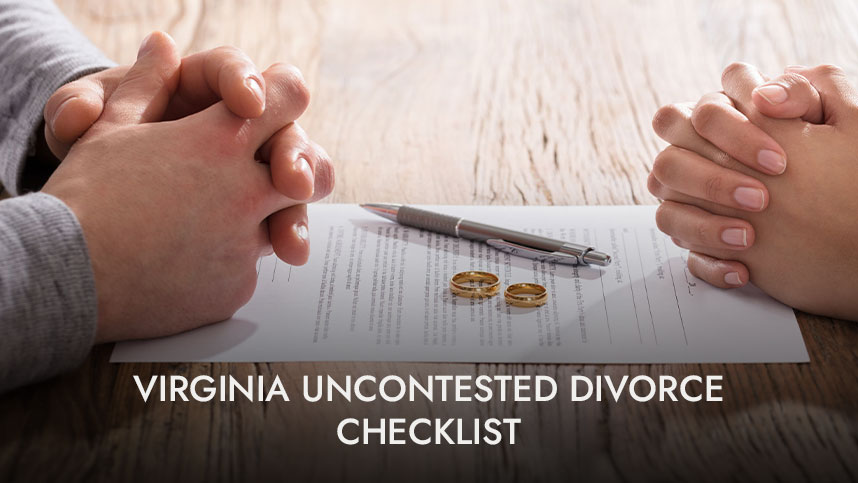Even a straightforward uncontested divorce in Virginia will affect many aspects of your life, especially your finances. Working with experienced attorneys who can defend your interests and make sure that legal requirements are met is beneficial.
Here are some key details you should be aware of concerning the filing procedure to make good decisions. The brief checklist provides suggestions for crucial issues that must be addressed and resolved during a divorce process.
1) Proof of Virginia residency
For Virginia residents, the spouse who files for divorce must provide evidence that they have resided in Virginia for at least six months, as required by the court. Rent payment records as well as papers like bank statements or a driver’s license could be used as proof.
2) Come to a consensus on crucial issues
Both spouses must agree on important financial matters and other areas of post-divorce life before filing for an uncontested divorce. The results should then be included in a written separation agreement. This document covers a wide range of potential points of dispute, such as:
Spousal Support
- Spousal expenses
- Cost of education or learning a trade
- Health insurance
Decisions involving the children and child support
- Legal custody
- Medical expenses
- Religion and discipline issues
- School choice and educational costs
- Payment amount, type, and schedule
Visitation
- Physical custody
- Vacations and holidays
- Moving and relocating
Debts and Property
- House and property expenses
- Checking and savings accounts
- Credit card debt and consumer debt
Other Resources and Concerns
- Business assets and liabilities
- Pension and retirement funds
- Securities and stocks
- Inheritance
- Life insurance
- Bankruptcy
3) Compliance to separation requirements
A couple with no children together and a written separation agreement needs to live separately for six months before filing for divorce. In all other situations, however, spouses must live apart for at least a year
4) Submit a Bill of Complaint with the Circuit Court
The Bill of Complaint, a Form VS-4, together with other court-specified information, must be included in the divorce filing. The clerk will assign a case number once all forms have been submitted to the court, and this number must be included in all future paperwork.
5) Send the other spouse legal notice
The other spouse must then get formal legal notice from the spouse who filed the initial Complaint. The notice must be accompanied by a copy of the Bill of Complaint, an official court summons, and other supporting paperwork. Usually, a neutral third party, such as a member of the sheriff’s office or a professional process server, delivers the notice.
6) Wait for a response
After receiving divorce papers, a spouse has 21 days to respond. Not replying means they might forfeit their right to oppose the divorce. The divorce may be granted by default in particular situations by the court. To expedite the process of serving, a receiving spouse can also sign a waiver notice form. A Final Order of Divorce, which must be signed by both spouses, settles any disputes over proper notice.
7) Present proof to the court if required
For the court to approve a divorce, evidence might be required. The process can be performed outside of court through deposition, mediation, affidavits or during a hearing with a judge during which parties can present their evidence as required.
8) Wait for results
The court should issue a Final Decree of Divorce if all the information presented satisfies the legal standards. The marriage is formally dissolved by this paper.
In-House Separation as an Option
What is in-house separation? In essence, those considering divorce maintain a separation while still residing in the same house. It takes more than just sleeping in different bedrooms to accomplish this. The pair must prove that they have lived separately from one another, without ever cohabitating under one roof. Though challenging, doing this is not impossible. Even though you might want to sign a separation agreement, always speak with a lawyer first.
In-House Separation Checklist
- Create separate bedrooms, closets, and bathrooms
- Stop sexual or romantic relationship
- Put away your wedding rings.
- Do your own grocery shopping and meal preparations.
- Don’t use food or other purchases made by your spouse.
- Do not share meals (unless on special occasions or children’s birthdays).
- Do your own chores and clean your own place.
- Open individual checking accounts.
- Stop engaging in social activities as a couple.
- Inform your loved ones and friends that you’ve split up.
- Use different entrances to the house, if possible.
Contact us
The skilled legal team at Holcomb Law, P.C. would be pleased to help you with any issues you may have, complete the necessary paperwork, and make sure that your rights are safeguarded in Virginia. To talk with an experienced family law attorney, contact us at (757) 656-1000 right away.










